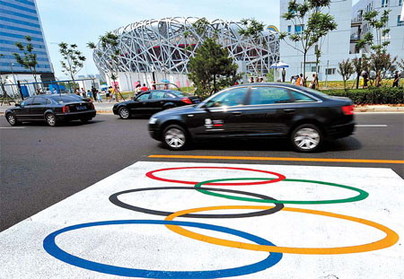Zhou Manjun has been driving in Beijing for a decade, but it was only Sunday that the motorist experienced one of his most pleasant trips in recent memory.
"It's Sunday, but there are much less vehicles on the road than usual," the 30-year-old employee of a securities firm said.
He is just one of the many residents who are starting to benefit from a two-month, odd-and-even license plate rule that allows Beijing's 3.3 million private car owners to drive into the city only on alternate days.

Motorists drive past a designated Olympic lane, which opened yesterday near the Olympic Green. The city has adopted strict driving restrictions to curb air pollution and traffic congestion for the Games. [Agencies] |
The rule, which started Sunday, is part of plans to control pollution and ease congestion in the Olympic host city.
As what he usually does on Sunday afternoon, Zhou left his home in the north of the city at about 2 pm for a regular meeting with friends near the financial area of Fuxingmen. Under the blue skies, only cars with even license plate numbers - like Zhou's car - were visible on the city's broad avenues.
Zhou was happy. It took him only 15 minutes to drive from the northern 4th Ring Road to the north of the 2nd Ring Road, a trip that usually takes him twice the time.
Still, the specially designated Olympic lanes that also came into effect Sunday caused Zhou a little trouble when he drove into the western 2nd Ring Road.
One such lane was empty even as the other two standard ones next to it were packed with vehicles.
"I never expected there would be such traffic today," he said.
Beijing has set 286 km of Olympic lanes on its 2nd, 4th and 5th ring roads, as well as on Chang'an Avenue.
Only certified Olympic vehicles are allowed in the lanes.
Wang Jianguo, a cabbie with the Beijing Beiqi Taxi Group, said similar slight congestion appeared on the eastern 2nd Ring Road Sunday afternoon. He said no one dared to drive in the Olympic lane, as drivers had been warned that a hi-tech surveillance network would identify violators to be fined.
"I'm thinking about riding my wife's bike to the nearest subway station and taking the metro instead," Zhou added.
Like Zhou, most motorists are expected to take public transport on days when their cars are banned.
More than 4 million people will use that option daily during the driving ban, the city's traffic management bureau has said.
To accommodate the expected increase in commuters, the city also opened three new subway lines on Saturday and 10 new bus routes Sunday.
The three subway lines, which helps link the existing network to Beijing's Capital International Airport and the Olympic Green where major venues of the Games are located, will increase the city's metro lines to eight and expand their reach by 40 percent to 200 km, Zhou Zhengyu, deputy director of the Beijing transport committee, has said.
The 10 new bus routes will also boost public transport around Olympic venues, while another 24 special bus routes for the Olympics will be opened on Aug 9, he said.
But not every motorist will turn to public transport. Some are considering renting a car or resorting to car-pools during the driving ban.
Commuters are also posting messages on a growing number of websites and on the notice boards of apartment complexes that facilitate car pools, searching for companion motorists with odd- or even-license plates.
Wang Zhiquan, who lives in Beijing's Haidian district, found a neighbor to car pool. "We live in the same complex and we found out that our companies are really close," he said.
Despite all the inconvenience, a survey conducted by the Beijing Social Facts and Public Opinion Survey Center showed that 94 percent of the about 1,000 people polled supported the driving restriction.
"We know the Olympics is an important event, and if we can make the air and traffic better by not driving for a while, it's certainly worth the trouble," Wang Zhiquan said.
To make trips a little easier for those who drive home in the late hours during the two-month driving ban, the city's traffic administration bureau said on Saturday that it would lift the even-and-odd ban between midnight and 3 am every day. The government has also encouraged people to work flexible hours.
Taxi drivers were understandably thrilled by the ban.
"It's going to be great for business many people will turn to us cabbies since they cannot drive," said a beaming Han Jianguo.
Xinhua contributed to the story